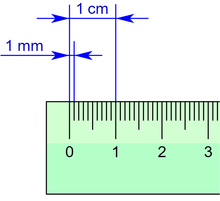Millimetre
The millimetre (international spelling; SI unit symbol mm) or millimeter (American spelling) is a unit of length in the metric system, equal to one thousandth of a metre, which is the SI base unit of length. Therefore, there are one thousand millimetres in a metre. There are ten millimetres in a centimetre.
| millimetre | |
|---|---|
 Ruler with millimetre and centimetre marks | |
| General information | |
| Unit system | SI derived unit |
| Unit of | Length |
| Symbol | mm |
| Named after | The metric prefix mille (Latin for "one thousand") and the metre |
| Conversions | |
| 1 mm in ... | ... is equal to ... |
| micrometres | 1×103 μm = 1000 μm |
| centimetres | 1×10−1 cm = 0.1 cm |
| metres | 1×10−3 m = 0.001 m |
| kilometres | 1×10−6 km |
| inches | 0.039370 in |
| feet | 0.0032808 ft |
One millimetre is equal to 1000 micrometres or 1000000 nanometres. Since an inch is officially defined as exactly 25.4 millimetres, a millimetre is equal to exactly 5⁄127 (≈ 0.03937) of an inch.
Definition
Since 1983, the metre has been defined as "the length of the path travelled by light in vacuum during a time interval of 1/299792458 of a second".[1] A millimetre, 1/1000 of a metre, is therefore the distance travelled by light in 1/299792458000 of a second.
Informal terminology
A common shortening of millimetre in spoken English is "mil". This can cause confusion since in the United States, "mil" traditionally means a thousandth of an inch.
Unicode symbols
For the purposes of compatibility with Chinese, Japanese and Korean (CJK) characters, Unicode has symbols for:
- millimetre (㎜) - code U+339C[2]
- square millimetre (㎟) - code U+339F[2]
- cubic millimetre (㎣) - code U+33A3[2]
In Japanese typography, these square symbols were historically used for laying out unit symbols without distorting the grid layout of text characters.
Measurement
On a metric ruler, the smallest measurements are normally millimetres.[3] High-quality engineering rules may be graduated in increments of 0.5 mm. Digital callipers are commonly capable of reading increments as small as 0.01 mm.[4]
Microwaves with a frequency of 300 GHz have a wavelength of 1 mm. Using wavelengths between 30 GHz and 300 GHz for data transmission, in contrast to the 300 MHz to 3 GHz normally used in mobile devices, has the potential to allow data transfer rates of 10 gigabits per second.[5]
The smallest distances the human eye can resolve is around 0.02 to 0.04 mm, approximately the width of a human hair.[6] A sheet of paper is typically between 0.07 mm and 0.18 mm thick, with ordinary printer paper or copy paper approximately a tenth of a millimetre thick.[7]
See also
| Look up millimetre in Wiktionary, the free dictionary. |
References
- "17th General Conference on Weights and Measures (1983), Resolution 1". International Bureau of Weights and Measures. Retrieved 3 December 2013.
- "CJK Compatibility" (PDF). unicode.org. Retrieved 3 December 2013.
- "How do I read a ruler?". onlineconversion.com. Retrieved 3 December 2013.
- "Accuracy of Calipers". TresnaInstrument.com. Retrieved 3 December 2013.
- Huang, Kao-Cheng; Wang, Zhaocheng (2011). Millimeter Wave Communication Systems. ISBN 9781118102756.
- "How Small Can the Naked Eye See?". Focus Magazine. Retrieved 3 December 2013.
- "Thickness of a Piece of Paper". hypertextbook.com. Archived from the original on 8 June 2017. Retrieved 3 December 2013.